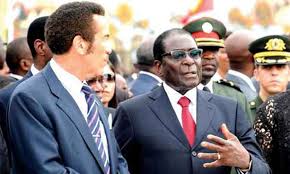ZwNews Chief Correspondent
Former Botswana President Ian Khama has challenged the Zimbabwean government to do away with measures that give room for senior government officials to participate in tenders awarding and procurement systems to avoid corruption.
Khama was presenting at the Confederation of Zimbabwe Industries Congress 2018 (CZI-Congress, 2018) in Bulawayo, yesterday on how his country managed to turnaround its economy for the better.
He said in Botswana, No government nor cabinet minister and/or permanent secretary is involved in government procurement processes, as that breeds corrupt tendencies. He added that, Botswana has a zero tolerance on corruption, and that the way this economic vice is dealt with among cabinet ministers in Botswana, sends a clear picture to white collar criminals in the private sector.
This is unlike in Zimbabwe where corrupt ministers can get away with it as long as they are still in office with only former cabinet ministers who would have fallen out of favour with the administration of the day being the ones under probe.
Khama said in his country all the state tenders and procurement systems are run by independent bodies who are accountable in the whole process.
Over the years, Zimbabwe has been losing millions of dollars to corruption. In both central and local governments, officials have been fingered in the awarding of tenders to cronies.
In some cases, tenders have been given to these officials’ shelf companies, friends etc, even those without capacity to deliver. According to economic analysts, corrupt tendencies in high offices, has led to the awarding of tenders to cronies, and not based on merit, but on who you are.
For many, the Wicknell Chivayo saga comes to mind, he was allegedly awarded a power tender under fraudulent circumstances, followed by reports that he had no capacity to deliver. The saga also sucked in former energy minister Samuel Undenge, who is currently serving a jail term on graft.
In Zimbabwe, red tape procedures have rendered the country unable to get a mirage as far as starting a business is concerned. With that in mind, Zimbabwe has over the years, become one of the most difficult place to invest in, leading some foreign investors shunning the country. Critics, attribute that this has seen some investors who at one point expressed interest in the country’s investment opportunities failing to come back and invest.
Meanwhile, the Zimbabwe Investment Authority made news in 2016/17 claiming to have registered a number of investments worth millions of dollars, but because of the bureaucratic processes involved it has seen no actual work on the ground.
Be that as it may, many corrupt officials have been able to exploit these long winding red tape processes to meet their selfish ends.
CZI has been publishing the ‘manufacturing sector surveys’ in these publications, the industry body looks into capacity utilisation and as well as other factors affecting industry. Corruption has been the common feature in most of these surveys. In 2016, it was highlighted that corruption was one of the country’s chief economic pull downs.













